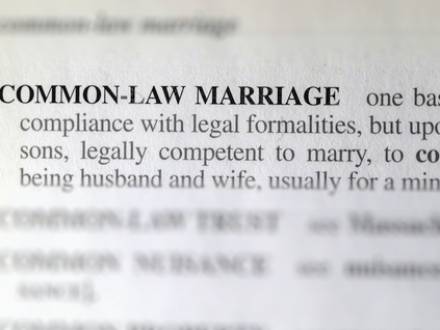Texas Estate Planning for Common-Law Spouses
 Common law marriage is currently allowed in only eight states (Colorado, Iowa, Kansas, Montana, New Hampshire, South Carolina, Texas, and Utah). A common-law marriage is a legally recognized marriage between two people who have not purchased a marriage license or participated in a formal ceremony. Many Texas couples build lifelong partnerships without ever obtaining a marriage license.
Common law marriage is currently allowed in only eight states (Colorado, Iowa, Kansas, Montana, New Hampshire, South Carolina, Texas, and Utah). A common-law marriage is a legally recognized marriage between two people who have not purchased a marriage license or participated in a formal ceremony. Many Texas couples build lifelong partnerships without ever obtaining a marriage license.
While common-law marriage provides partners with many of the same inheritance and property rights as formally married spouses, those rights are not automatic and may need to be proven in court. Without proper estate planning, surviving partners in a common-law marriage can face challenges from family members, lose shared property, or be excluded from decision-making altogether.
Careful estate planning can ensure that each partner's intentions are protected, preventing expensive, time-consuming probate battles. If you have a common-law marriage in Texas, you must speak to an experienced Erath County, TX estate planning lawyer.
Understanding Common-Law Marriage in Texas
Under Texas Family Code Section 2.401, common-law partners must agree to be married, cohabit in Texas as spouses, and "hold out" to others as married. Common-law marriage ends only through death or divorce, but not separation. Both individuals must be at least 18 years old, not related by blood, and not married to anyone else. The number of years a couple has been together is not particularly important; the present intent and agreement to be married are important.
"Holding out" to others that a couple is married includes introducing one another to others as "husband" and "wife." It also includes things like signing a lease or taking out a mortgage as a married couple, wearing wedding rings, filing joint tax returns, having joint bank accounts, or listing one another on forms such as insurance policies.
Why Estate Planning is Crucial for Common-Law Couples
Common-law status must often be proven after the death of one of the partners, resulting in major probate complications. If other family members contest the relationship, the surviving partner may be treated as a non-spouse. Lack of comprehensive documentation of common-law status can adversely affect inheritance rights, homestead rights, community property claims, and medical and financial decision-making authority. Common-law couples should consider the following estate planning tools:
- Wills should clearly identify the partner as "spouse" or intended heir to avoid intestate challenges by other family members.
- Transfer-on-Death and Pay-on-Death designations can help bypass probate for real estate, banking and other accounts, and vehicles.
- Joint ownership agreements can protect real property and clarify ownership percentages.
- Powers of Attorney documents can ensure that medical and financial control remains with the partner in the event of incapacity or death, rather than going to other family members.
- Advance Directive documents can avoid conflicts regarding medical decisions.
- A Declaration of Informal Marriage can be filed with the county clerk to formalize the relationship and provide legal clarity.
With proper estate planning, common-law spouses have the same community property rights as formally married couples. However, complexities can arise when property was acquired before cohabitation or when "holding out" as a married couple began mid-ownership. Clear postnuptial agreements can protect a couple’s intent and document the commingling of assets.
How Can a Common-Law Marriage Partner Prove the Relationship in Probate?
Surviving partners can prove common-law marriage status in probate court with evidence like joint accounts, beneficiary designations, joint deeds, and testimony from friends or neighbors. Mail addressed to both individuals at the same address, filing joint tax returns, and wearing wedding rings are also strong evidence of a spousal relationship, as are text messages, emails, or social media posts that refer to one another as spouses.
Contact a Somerville, TX Estate Planning Lawyer
Clear documentation in estate planning documents removes any doubt regarding a partner’s intent, reducing the need for litigation and family conflict. If your partner has passed away and family members are disputing your status as a spouse, do not face the Texas probate court on your own. An Erath County, Texas probate attorney from The Law Offices of Rob Christian can help you gather the right evidence, file the necessary petitions, and fight for your rightful share of the estate. Schedule your free consultation by calling 682-936-4003.





